| Porky Pig | |
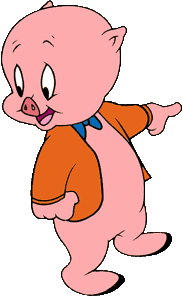
| |
| First Appearance: | I Haven't Got a Hat (March 2, 1935) |
|---|---|
| Created by: | Friz Freleng (original design)
Bob Clampett (final design) |
| Voiced by: | Joe Dougherty (1935-1937)
Mel Blanc (1937 - 1989, his death) Bob Bergen (1990 - present) Billy West (My Generation G...G...G... Gap, Daffy Contractor) |
| Informations | |
| Gender: | Male
|
| Species: | Pig |
| Friends: | Daffy Duck, Petunia Pig, Bugs Bunny |
Porky Pig is an animated cartoon character in the Warner Bros. Looney Tunes and Merrie Melodies series of cartoons. He was the first character created by the studio to draw audiences based on his star power, and the animators (particularly Bob Clampett) created many critically acclaimed shorts using the fat little pig. Even after he was supplanted by later characters, Porky continued to be popular with moviegoers and, more importantly, the Warners directors, who recast him in numerous everyman and sidekick roles. He is known for his signature line at the end of each short, "Th-th-th-that's all folks!" The slogan had also been used by both Bosko and Buddy and even Beans at the end of every Looney Tunes cartoon. In contrast, the Merrie Melodies series used the slogan: So Long, Folks! until the late 1930s when it was replaced with the same one used on the Looney Tunes series. (When Bugs Bunny was the closing character, he would break the pattern by simply saying, "And Dat's De End!")
Porky's most distinctive trait is a severe stutter, which he sometimes compensates by replacing his words; for example, "What's going on?" might become "What's guh-guh-guh-guh—...what's happening?". In the ending of many Looney Tunes cartoons, Porky Pig bursts through a bass drum head, and his farewell line "That's all folks!" becomes "Th-Th-Th-Th-Th-... That's all, folks."[citation needed] Porky Pig would appear in 152 cartoons[citation needed] in the Golden Age of American animation.
Early films[]

Black
The character was designed by animator Bob Clampett and introduced in the short I Haven't Got a Hat (first released on March 2, 1935), directed by Friz Freleng. Studio head Leon Schlesinger suggested that Freleng do a cartoon version of the popular Our Gang films. Porky only has a minor role in the film, but the fat little stuttering pig quickly became popular. Porky's name came from two brothers who were childhood classmates of Freleng's, nicknamed "Porky" and "Piggy".[1]
Since Hugh Harman and Rudolf Ising had left the studio in 1933, taking the studio's star character Bosko with them, Looney Tunes had been kept afloat by cartoons featuring the bland Buddy. Porky's introduction ushered Buddy out the door and pointed to things to come. Tex Avery was hired to the studio in 1935, and his film Gold Diggers of '49 reused much of the cast from I Haven't Got a Hat, albeit in wildly different roles. Porky transitioned from a shy little boy to an immensely fat adult. Though he was still in a supporting role, Porky got most of the laughs. The directors realized they had a star on their hands.
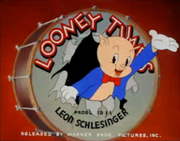
For nine years, Porky would end a cartoon by bursting through a bass drum, saying "Th-Th-Th-Th-Th-That's all, folks!".
Porky shared his stutter with the voice actor who originally played him, Joe Dougherty, who actually did have a stuttering problem. Because Dougherty could not control his stutter, however, production costs became too high and his recording sessions took hours. The versatile Mel Blanc replaced Dougherty in 1937. Blanc continued the stutter; however, it was harnessed for a more precise comedic effect (such as stumbling over a simple word only to substitute a longer word without difficulty).[2] This is parodied in A Connecticut Rabbit in King Arthur's Court, where Bugs Bunny struggles to pronounce the word "porcupine", which Porky pronounces with no trouble.
Porky's Duck Hunt was released in 1937, and Blanc officially became the permanent voice of Porky until his death in 1989. In later interviews, Blanc often made the claim that he intended Porky's stutter to be suggestive of the grunting of actual pigs (although other cartoon pigs do not have such a severe stuttering problem). Porky is currently voiced by Bob Bergen.
Clampett's Porky[]
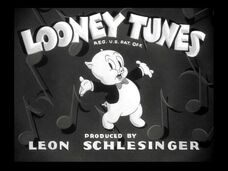
Bob Clampett's Porky Pig intro in 1938-39 .
Porky starred in dozens of films in the late 1930s. The directors still did not have a grasp on the character, however; his appearance, age, and personality all varied from picture to picture. Several such cartoons show Porky as a child with parents: father Phineas (Porky the Rainmaker, Milk and Money, Porky's Poppa, Porky and Teabiscuit) and an unnamed mom (Wholly Smoke, Porky's Hero Agency). Bob Clampett finally pinned Porky down, making him a permanent young adult: cuter, slimmer, smarter, and eventually less of a stutterer. Clampett's Porky was an innocent traveler, taking in the wonders of the world—and in Clampett's universe, the world is a very weird place indeed.[3] This principle is perhaps best demonstrated in Porky in Wackyland, a film that sends Porky on a quest to find the last of the Dodos. This cartoon was selected for preservation by the National Film Registry in 2000.[4]
In his commentary as part of the 1970s documentary film, Bugs Bunny: Superstar, Clampett discussed the fact that his early version of Tweety Bird had to be redesigned after his first picture because the producers thought he "looked naked". Meanwhile, as Clampett noted, nothing was ever made of the fact that "all those years, Porky never wore any pants!" However, Porky was seen with pants in Porky's Badtime Story and its color remake, Tick Tock Tuckered.
Porky as sidekick[]
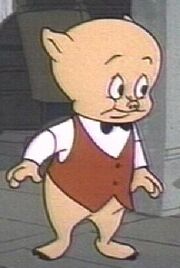
Porky in Daffy's Inn Trouble
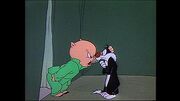
Porky Pig asks Sylvester the cat (in a non speaking role) to explain himself after disrupting his sleep, in Jumpin' Jupiter (1965).
Porky's post at the pinnacle of the Warners' pantheon was short-lived however. In 1937, Avery pitted Porky against a plucky black duck who soon was christened Daffy and who became the studio's biggest star (until himself replaced by Bugs Bunny). In fact, Friz Freleng satirized this phenomenon when he directed You Ought To Be in Pictures (1940). The film features Daffy convincing Porky to quit his job at Warner Bros. to find better-paying work elsewhere. In turn, Porky convinces studio head Leon Schlesinger to release him from his contract. After a highly unsuccessful foray into the real world, Porky returns happily to the studio that created him. To this day, Porky remains as a loyal sidekick while Daffy refuses to be a second banana to Bugs.
Porky always remained a sentimental favorite of the Warner directors. His mild-mannered nature and shy demeanor made him the perfect straight man for zanier characters such as Daffy. He still starred in a few solo cartoons as well, such as Frank Tashlin's Swooner Crooner.
Other cartoons dumbed Porky down and cast him as a duck hunter after Daffy, largely paralleling the Elmer Fudd/Bugs Bunny pairings. Chuck Jones perfected the Porky-as-straightman scenarios, pairing the pig with Daffy Duck in a series of film parodies such as Drip-along Daffy, Duck Dodgers in the 24½th Century, Deduce, You Say, and Robin Hood Daffy. Jones also paired Porky with Sylvester in a series of cartoons in the late 1940s and early 1950s, in which Porky plays the curmudgeonly owner of the cat and remains clueless that Sylvester is constantly saving him from homicidal mice, space aliens, and other threats.
Later years[]
Porky was used in regular rotation in television syndication beginning in the 1960s, as was the rest of the Looney Tunes co-stars. A Saturday morning cartoon, The Porky Pig Show, ran from 1964 to 1967.[5] In 1971, he starred in another show, Porky Pig and Friends.[5] Both of these programs were collections of old theatrical shorts. Porky also appeared in all the classic film-feature compilations in the 1970s and 1980s. Another such collection was the 1986 film, Porky Pig in Hollywood, which ran in art and college theaters. In the 1990s animated series Tiny Toon Adventures, Porky appears as the mentor of Hamton J. Pig. Porky also made cameos on Animaniacs and Histeria. Porky Pig also appears as the "Eager Young Space Cadet" in the animated television series Duck Dodgers.
In 1991, Warner Bros was picketed by the National Stuttering Project (NSP) of San Francisco and sued by an obese New York man who claimed that as a stuttering child he was taunted with the nickname "Porky", demanding that they stop "belittling" stutterers and use Porky Pig as an advocate for child stutterers. The studio refused the NSP but eventually agreed to grant $12,000 to the Stuttering Foundation of America for a 1994 conference. After continued pressure from NSP member Ira Zimmerman, Warner Bros. released a series of public service announcement posters featuring Warner's characters, including Porky, speaking out against harassment and intimidation and in favor of toleration for others with speech and physical impairments. Despite these recent protests, Porky continues to feature in new Warner Bros. animation.
Porky is the star of the Super NES video game Porky Pig's Haunted Holiday. Porky also has a cameo at the end of the 1988 Disney/Amblin film Who Framed Roger Rabbit (1988), where, paired with Disney's Tinkerbell, has the duty of closing the movie with his famous line "Th-Th-Th- That's All Folks!".
In the movie Looney Tunes: Back in Action, Porky makes a cameo appearance alongside Speedy Gonzales, where they both lament their politically incorrect status. At the end of the movie, Porky tries to say his classic line, but stutters so much, the lights are turned off around him as the studio closes for the night; so an irritated Porky simply says, "Go Home, folks.".
Porky had a descendent in Loonatics Unleashed named Pinkster Pig, an old friend of Danger Duck, who was Daffy Duck's Descendant. Pinkster became a villain when he was adopted by Stoney and Bugsy, who are descendants of Rocky and Mugsy.
Porky was on TV Guide's list of top 50 cartoon characters [1]. He was shown on one of that issue's two covers in a crossover scene with Duck Dodgers and The Powerpuff Girls. [2]
Porky Pig will appear in The Looney Tunes Show voiced by Bob Bergen.
"Blooper"[]
A very short black-and-white cartoon was made in 1938 as part of a Warner Bros. blooper reel.[6] It was shown on the Warner Bros. 50th Anniversary TV show. Porky is shown doing some carpentry work, pounding nails, when he smacks his thumb with the hammer. Grimacing in pain, he cries, "Oh, son of a bi-bi-, son of a bi-bi-, son of a bi-bi-bi-... gun!" He then turns to the camera and says "Ha-ha-ha! You thought I was gonna say 's-s-son of a bitch', didn't ya?!"[7] This short, so-called "blooper" can also be found on the Looney Tunes Golden Collection: Volume 4 of 2006, under the title Porky's Breakdowns (with several versions of the clip, making it look like a true "blooper"), and on an Each Dawn I Die DVD box set, also released in 2006.